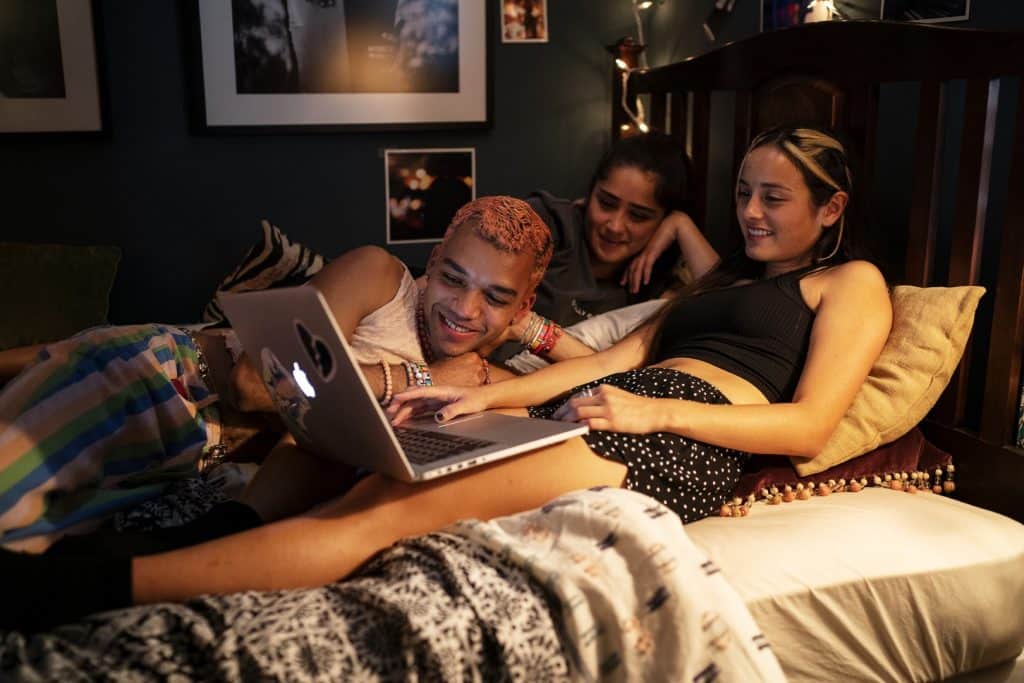Read also:
How to Watch FX Live Without CableHow To Watch AMC Without CableHow to Watch ABC Without CableHow to Watch Paramount Network Without CableCo-created by a father and daughter duo, HBO Max’s latest teen dramedy starts on shaky ground, but shows promise.
High school sucks. You know it, I know it, we all know it. Yet, culturally, we can’t leave this awful period of our lives alone, like a scab we have to pick over and over again. For what seems like eons, the high school sex drama has been a staple, whether it’s American Pie or Euphoria, we just can’t seem to stop obsessing over the sex lives of teenagers. But who are these movies and shows for? Are these for teenagers, or adults recreating high school in the image they wish it was, rather than what it is.
When I saw the young, attractive out gay jock wearing Wacky Wacko and listening to Jessie Ware (two things this thirtysomething homosexual man loves), it seems pretty apparent that Generation falls into an older queer person’s idealized vision of the most openly queer generation.
The creation of Zelda Barnz and her father Daniel , and produced in part by Lena Dunham, Generation (stylized as Genera+ion by HBO) is a coming of age series focused around a group of friends in a high school (presumably set in the Los Angeles metro). The first three episodes available for its premiere on HBO Max focus primarily on Chester (Justice Smith), the aforementioned gay jock, Greta (Haley Sanchez), a young lesbian and child of immigrants, and twins Nathan (Uly Schlesinger) and Naomi (Chloe East), whose mother Megan (Martha Plimpton) controls her family through sheer force of will.

The inaugural episodes deal with fairly classic tropes of the high school drama, such as ragers, dealing with adolescent awkwardness, and oppressive family situations. There are also the more modern additions to the genre: the second episode centers around a lockdown and all of the episodes center around the plethora of gender and sexual identities that society has become more accepting of than ever before.
Full disclosure: I found the first two episodes, and especially the pilot, to be fairly insufferable. They are rife with cliché and screams “been there, done that.” When Chester tells the new guidance counselor Sam (Nathan Stewart-Jarrett) “I appreciate you being honest. No one ever is,” my eyes went so far back into my head that I almost had an out-of-body experience. The amount of teen angst and faux deepness in the first two episodes feels more than a little cringeworthy.
Yet by the third episode, my distaste started to dissipate. The third episode, “Toasted,” focuses on the relationship between Naomi and Nathan, when Naomi learns that Nathan – who is grappling with his bisexual identity – was fooling around with her boyfriend. Maybe it’s just a personal soft spot (I am a twin after all), but the twin relationship is a dynamic that is rarely explored in narratives, and the friendship and antagonism between twins is a narrative well you can draw a lot from. The first episodes also cold open with one of the young women giving birth in a mall bathroom, her identity hidden, which helps keep you watching to learn more.
Generation falls into an older queer person’s idealized vision of the most openly queer generation.
And even when the situations are cringe, the characters are at least interesting. Chester is intended, quite obviously, to be the runaway character. With a fashion sense to die for and a self-assuredness in his sexuality and presentation, it is great to see a character who is not afraid to be femme but also interested in sports. Greta, the soft-spoken young lesbian, is by far the most endearing, and a character who will hopefully be featured more in coming episodes.
Of the adults, Stewart-Jarrett plays Sam with an ambiguity that makes you wonder how his story arc will play out. From the beginning, Chester crushes hard for Sam and is not subtle in his affections. Sam, while remaining professionally, never truly rebuffs Chester’s advances, opening a pathway for an interesting future plotline.
Hardly surprising, however, is veteran actor Martha Plimpton as Naomi and Nathan’s mother Megan who commands the screen when featured. She’s visually stunning and imbues her character with a mixture of 50’s housewife and ’80s businesswoman, both modern and traditional.
Technically, Generation excels. The narrative structure is often told through various points of view, with scenes repeated through each character’s eyes. This Rashomon-esque technique provides narrative depth, but the overlap between scenes is minimal so it feels as if more is being revealed as opposed to just being repeated.

The music and visuals are frenetic, giving high-paced energy that can sometimes be invigorating, and at other times are a bit tiring. For example, scenes of characters visiting different school clubs in the second are a little too frenetic, even if it does provide a nice contrast to the lockdown later in the episode.
The problem with television, as opposed to a film, is the way in which a show can grow over time, as opposed to the discreet product of a film. If I had been a viewer trying out a new show on a streaming service rife with other choices, I probably wouldn’t have continued past the pilot – and honestly, I probably wouldn’t have even finished the first episode.
But the third episode piqued my interest, as it delved deeper into the cast of characters, and I felt myself wanting more. In the end, if the premise of a modern version of the classic high school coming of age story interests you, commit to watching more than the first two episodes, and you may find something to love.
New episodes of Generation play Thursdays on HBO Max.